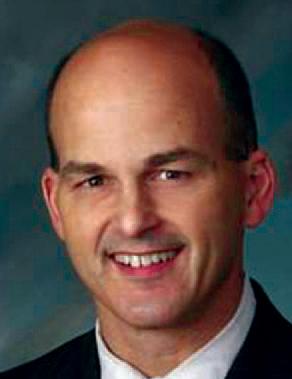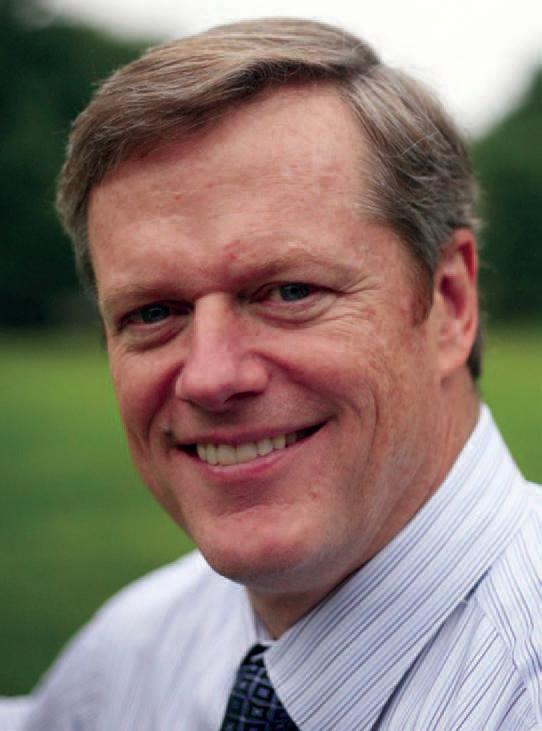With election day less than a week away, registered voters in the commonwealth of Massachusetts are considering who to pull the lever for on November 2nd as cam- paigns enter the final stretch of what has been a long and contentious campaign. A recent Rasmussen poll on October 18th placed incumbent Governor Deval Patrick with a small lead of GOP chal- lenger Charlie Baker 47% to 42%. Patrick’s lead in such polls has been consistent since March of this year, but did not increase with the recent visit of his close friend President Barack Obama. On the UMass Boston campus, talk of the Gubernatorial race is rare, but dis- course about the issues are all too com- mon. With growing concerns about the economy, jobs, and health care, one of the more unifying issues surrounding this election is education–specifically public higher education. Students remember all too well the fee hike struggle they fought against last year, but realize that it still weighs heavily on their ability to continue and graduate from UMB, a campus where a majority of students receive some sort of educational aid funding. In a telephone interview with the Mass Media and other student journalists from Boston area colleges and universities, Governor Patrick pledged to continue his commitment to higher education if given a second term. “At UMass Boston, our campaign is committed to the institutions master plan, which in our eyes focus on affordable edu- cation opportunities for all residents of the commonwealth who intend to pursue one” Patrick said. Citing a major contrast in budget pro- posals between the two campaigns, Patrick mentioned that UMass Boston and other public institutions would face a sever cut in funding under Baker’s control. “They are making false claims about an out of control budget, but in reality their plan calls for $2 billion worth of cuts, which would most directly affect education”. Over the past four years the Patrick ad- ministration has used ‘rainy day’ funds in times of fiscal and financial crisis. Most recently, they were able to allocate fed- eral stimulus dollars within the budget for higher education, replacing students dollars with federal dollars and hedging off a sudden increase in tuition costs. Pat- rick says students can expect more of such sound leadership if given a second term. TIM Cahill Interview : MM: What is your background before public service? TC: I graduated from Boston University in 1981, I ran for city council right out of BU with a couple of friends of mine, guys I went to high school with. I was unsuc- cessful – the first race I ran, the only race I’ve lost. So we were looking for work. It was a similar market to today. We decided we wanted to open our own business, a gym. When we did research we realized it was too expensive. We decided we’d start with a juice bar and expand to the gym later, but the juice bar became Handshakes Cafe and we decided that was the route we were gonna take. MM: This year, why are you running for governor? TC: I don’t think the government we have right now is working. I am not only running for governor but left my party and am running as an independent. I did [this] last year based on my frustration with taxes, the lack of any initiatives for small businesses and the general malaise we have here regarding our economy: the fact that it’s not working, that we’re not growing jobs and that government doesn’t seem to understand the needs for small businesses to thrive and grow… When the recession hit in 2008, I started to warn people that we were heading for a crash, that we had to restrict spending and get control of our finances. Those warn- ings fell on deaf ears, both in the Gover- nor’s mansion and in the State House. I realized in 2009 that if I was gonna have a true impact it would have to be in the Governor’s office, not the Treasurer’s of- fice. MM: Governance is a delicate balancing act. People want services but don’t want to pay higher taxes. Right now we have fiscal problems and can’t necessarily rely on help from the Federal government. Are there any programs you would cut? TC: here’d probably be a number of pro- grams we would cut. I’m not ready to get into specifics right now, but I think we’d have to look at spending less on trans- portation, health and human services, possibly on education, healthcare, local aid… I think there can be no sacred cows. The next governor is going to have to be prepared to make cuts, more than likely across the board. I think those are the most difficult to get done but also the only way you can effectuate real savings, and let everyone know that there are no sacred cows. If you pick and choose you make it more difficult to make the real cuts when you have to. The key to making govern- ment work is at a level where taxes are at a reasonable cost and services are what people expect is to grow the economy. MM: How will you make up for the rev- enue shortfall that your tax cuts (sales tax and income tax) would create? TC: Well, it will only create a revenue shortfall in advance of us growing jobs. The goal is to increase revenue, or at least make up for the revenue through job growth. I think it’s doable. Its a supply-side argu- ment but I believe in it and I know it works. Jill Stein Interview: MM: What did you do before entering public service? JS: I worked as a medical doctor ob- serving the epidemics of asthma, can- cers, learning disabilities and our broken healthcare system. I got to work as an ad- vocate for ordinary people to get a better break, and found that the political system didn’t really care if you weren’t coming with deep pockets and full of bills and campaign contributions and lobbyists. It didn’t much matter what kind of solutions we put on the table, we live in a pay-to- play political culture on Beacon Hill. I was invited to run for office based on that work back in 2002. I ran for governor out of desperation but emerged from that campaign with a lot of inspiration. I found that when you actually have a chance to go out and talk with everyday people, they re- ally agreed that the political system, even back then, was incredibly broken. MM: What prompted you to put your hat in the ring this year? JS: This year, I found myself looking at three Beacon Hill candidates who have been a part of the problem, all of them. Deval Patrick has essentially adopted the Romney agenda. I think we’ve been going very much in the wrong direction. If you look at the direction we’re going it’s not a good one. Looking at jobs, education, the cost of higher education – we’ve paid out more in corporate entitlement programs than we do in higher education. MM: The current Massachusetts health- care system, which Mitt Romney signed into law, is the seed for the healthcare package that passed in the US Congress. It’s provided greater access to healthcare in the state but it hasn’t contained costs. What is your approach to dealing with the cost containment issue? JS: We need fundamental health care re- form. The profiteering Wall Street health- care system has been tweaked for decades; there’s not a tweak out there they haven’t tried. What we’re seeing from Beacon Hill is basically window dressing, more of the same kind of ineffective token gestures to- ward cost containment we’ve done before. They’re talking about price controls, cost-shifting and profit limitations which are easy to loophole right around. Yet cost containment will create limitations of care MM: what you buy for your healthcare dollar will be scaled down. JS: None of these get us to the endpoint of controlling costs while providing qual- ity affordable healthcare for all. That is the point. It’s not simply to limit costs; it’s to limit costs and give us value for our healthcare dollars. Right now our health- care dollars are squandered in a profiteer- ing system that’s devoured by bureaucracy and red tape. When you simplify that, in a Medicare-for-all system, where the over- head is 3% rather than 15% – or nation- ally 30% – for tracking who’s the provider, what are their rules, what medications do they cover, what dosages… there’s all kinds of minutiae that gobbles up healthcare time and dollars. start choosing their healthcare provid- ers again and for providers and consumers together to make healthcare decisions not by a CEO behind closed doors. Charlie Baker Charlie Baker did not grant an interview “Since I entered this race more than a year ago I have met thousands of people across the Commonwealth, talking to them about the direction Massachu- setts is headed and what we need to do to change it. I have enjoyed meeting you and have enjoyed answering your ques- tions through this forum. I hope you have learned about our campaign and know the direction we will take this state, and I hope you are able during the final weeks and days of the campaign to bring your family and friends to a campaign event and hear from me directly.” Jim McKenna Interview Republican candidate for Attorney General discusses his platform MM: What was your background before politics? JM: I worked briefly in New Hampshire for the Office of Legislative services, draft- ing legislation for ten months. Then I went to Ohio and was a prosecutor there for fifteen months. From there I went to the Suffolk County DA’s Office for three years, public corruption, organized crime. There was a massive public corruption case… I was appellate attorney on that. Af- ter that I went to the DAs office in Worces- ter where I did a lot of appellate work. I also ran the grand jury there for two years. It was a wonderful experience for insight into criminal law and cases. For 17 years I have taught mainly business law and eth- ics at WPI, as well as environmental law and ethics, and international business law. It was interesting in terms of breadth of coverage. MM: Why did you decide to enter the political arena? JM: I’ve held signs for people over the years. By 2002, I was campaign coordina- tor for Greg White for District Attorney in Worcester. In 2004 I was chairman of a state senate campaign in Worcester. This year I was working for Mary Connaugh- ton; after the [state Republican] conven- tion, we discussed where we’d go from here in terms of her campaign. She said, “I’m surprised you didn’t run for Attorney General.” Until she said that I hadn’t given it any consideration at all. I was kind of, “Well, y’know, that might be a good thing.”
Gubernatorial Race

Photo Courtesy of Facebook
Jim McKenna, Republican candidate for Attorney General
Photo Courtesy of The Wicked Local Blog
Charlie Baker

